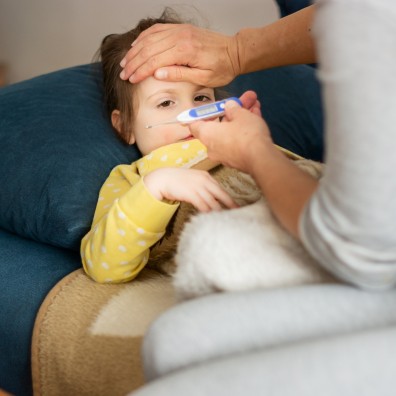By Registered Health Visitor – Julia Headland

Glandular Fever, otherwise known as infectious mononucleosis or ‘mono’ for short is a clinical diagnosis that is most commonly caused by the Epstein-Barr (EBV) virus (National Institute for Health and Care Excellence (NICE), 2021). It is a member of the herpes family and the EBV is a lifelong, predominantly latent infection. The condition is ordinarily seen in people aged between 15 and 24 years, however it can occur at any age and is therefore seen in children as well.
Symptoms of Glandular Fever
Thankfully babies and young children with glandular fever present as asymptomatic or have mild symptoms that may present like a common cold. Older children who get it though are likely to print with more pronounced symptoms such as:
Fever
Swollen glands which can be in the neck, armpit, groin , head and elbows
Sore throat
Headache
Tiredness
Sore muscles
Stomach pain with enlarged swollen liver or spleen
Loss of appetite
At first, a child may may present as having flu or strep throat as the symptoms can be similar however, diagnosis of Glandular fever can only be done through a blood test.
So how is Glandular fever transmitted?
The primary transmission of glandular fever is through close personal contact with an infected individual particularly by saliva. It can also be spread through sexual contact, blood transfusions, organ transplantation and intrauterine transmission (NICE,2021).
Treatment for Glandular Fever
Glandular fever is usually a self-resolving condition; it is a viral illness and therefore not usually resolved with antibiotics.
NICE guidelines state that the best treatments include antipyretics (used to reduce fever) or anti-inflammatories. Steroids may be prescribed if a patient’s airway is compromised.
You must not give aspirin to anyone with glandular fever as it can cause a potentially fatal condition called Reye’s syndrome (noting that children under the age of 16 should not be given Aspirin anyway).
Hydration, rest and a good nutritional intake should be encouraged.
Although exclusion from nursery, school or the workplace is not necessary, heavy lifting and sports should be avoided for the first month of illness to avoid the risk of subsequent complications (Noakes, 2024).
Complications of Glandular fever include:
Guillain-Barre syndrome.
Bell’s palsy.
Ruptured spleen and Chronic fatigue.
Ways to reduce transmission of glandular fever:
Ensure that a person who is infectious does not kiss others or share any cutlery, cups, or toothbrushes.
Wash hands after coughing or sneezing.
Don’t share straws.
Unfortunately reducing transmission is tricky as people can be infectious for up to 7 months before becoming symptomatic and up to 18 months after having the infection (NICE, 2021)
———End———
For those people I have not yet met, my name is Julia Headland and I am a registered health visitor and registered general nurse with a degree in public health and over 20 years of experience. I am very pleased to work alongside the Norfolk House Nursery team.
You can arrange to meet me for confidential advice or guidance about your child’s health or development; during the pandemic these consultations are being conducted by Zoom or telephone.
My consultations are free of charge and they are confidential.
You can book an appointment with me via the Norfolk House Nursery staff.
You can also follow me on social media:
Facebook: @JuliaHeadlandPrivateHealthVisitor
Instagram: jh_privatehealthvisitor
